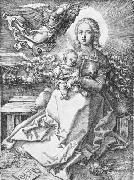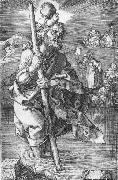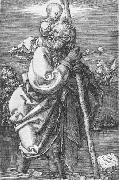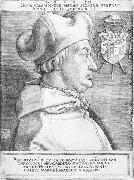All Albrecht Durer Oil Paintingsb.May 21, 1471, Imperial Free City of N??rnberg [Germany] d.April 6, 1528, N??rnberg |
|||
 |
|||
|
|
|
||||||||||
|
|
||||||||||
|
Madonna Crowned by an Angel Gemälde IDENTIFIZIERUNG:: 63614 |
Madonna Crowned by an Angel 1520 Engraving, 139 x 100 mm Metropolitan Museum of Art, New York According to D?rer's diary he gave away this Virgin as a present on four occasions. It is not as decidedly in the new style, but nevertheless distinguished by the new accent on frontality, exemplified by the youthful, idealized head. A peculiar impression is created by the white face and the concentration of the light on the skirt. It seems almost as if the scene were illuminated by lightning - the wind-blown hair, the creeping clouds, the upswept drapery of the angel - and in these surroundings sits the Virgin, smiling even though empty of expression, quite serene and aristocratic, idealized in the style of ancient, mild beauty. It can be noted its abstract rigidity, exemplified by the stiffly erect posture and the angular drapery, in all of which it surpasses the Madonna Crowned by Two Angels.Artist:D?RER, Albrecht Title: Madonna Crowned by an Angel Painted in 1501-1550 , German - - graphics : religious 1520 Engraving, 139 x 100 mm Metropolitan Museum of Art, New York According to D?rer's diary he gave away this Virgin as a present on four occasions. It is not as decidedly in the new style, but nevertheless distinguished by the new accent on frontality, exemplified by the youthful, idealized head. A peculiar impression is created by the white face and the concentration of the light on the skirt. It seems almost as if the scene were illuminated by lightning - the wind-blown hair, the creeping clouds, the upswept drapery of the angel - and in these surroundings sits the Virgin, smiling even though empty of expression, quite serene and aristocratic, idealized in the style of ancient, mild beauty. It can be noted its abstract rigidity, exemplified by the stiffly erect posture and the angular drapery, in all of which it surpasses the Madonna Crowned by Two Angels.Artist:D?RER, Albrecht Title: Madonna Crowned by an Angel Painted in 1501-1550 , German - - graphics : religious |
|||||||||
|
|
||||||||||
|
|
St Christopher Facing to the Right Gemälde IDENTIFIZIERUNG:: 63616 |
St Christopher Facing to the Right 1521 Engraving, 117 x 75 mm Metropolitan Museum of Art, New York This is the first engraving after D?rer's return from his long stay in the Netherlands. He had left on July 12, 1520, together with his wife and a maid, in order to appeal to the new Emperor, Charles V, to confirm his annuity. No engravings were executed during this trip. D?rer returned to Nuremberg toward the end of July 1521, having been greatly honoured, yet also a sick man suffering from malaria. This engraving is presumably based on one of the several drawings D?rer made at Antwerp for the Dutch landscape painter Joachim Patenier in May 1521. The hermit in the background is carrying a torch.Artist:D?RER, Albrecht Title: St Christopher Facing to the Right Painted in 1501-1550 , German - - graphics : religious 1521 Engraving, 117 x 75 mm Metropolitan Museum of Art, New York This is the first engraving after D?rer's return from his long stay in the Netherlands. He had left on July 12, 1520, together with his wife and a maid, in order to appeal to the new Emperor, Charles V, to confirm his annuity. No engravings were executed during this trip. D?rer returned to Nuremberg toward the end of July 1521, having been greatly honoured, yet also a sick man suffering from malaria. This engraving is presumably based on one of the several drawings D?rer made at Antwerp for the Dutch landscape painter Joachim Patenier in May 1521. The hermit in the background is carrying a torch.Artist:D?RER, Albrecht Title: St Christopher Facing to the Right Painted in 1501-1550 , German - - graphics : religious |
||||||||
|
|
||||||||||
|
|
St Christopher Facing to the Left Gemälde IDENTIFIZIERUNG:: 63617 |
St Christopher Facing to the Left 1521 Engraving, 119 x 75 mm Metropolitan Museum of Art, New York This engraving is obviously the later of the two versions of 1521. The meaning is here conveyed more poignantly, as the saint, instead of looking straight ahead, turns his head toward the Infant Christ. The hermit, in this case, is moved further into the background. This engraving is probably also based on the drawings prepared for Joachim Patenier. It can be noted in this connection that Patenier's painting at the Escorial shows a quite similar group, only in mirror image. Both engravings are based on the account of St Christopher in Passional oder der Heiligen Leben, Nuremberg, 1488, published by Anton Koberger, D?rer's godfather.Artist:D?RER, Albrecht Title: St Christopher Facing to the Left Painted in 1501-1550 , German - - graphics : religious 1521 Engraving, 119 x 75 mm Metropolitan Museum of Art, New York This engraving is obviously the later of the two versions of 1521. The meaning is here conveyed more poignantly, as the saint, instead of looking straight ahead, turns his head toward the Infant Christ. The hermit, in this case, is moved further into the background. This engraving is probably also based on the drawings prepared for Joachim Patenier. It can be noted in this connection that Patenier's painting at the Escorial shows a quite similar group, only in mirror image. Both engravings are based on the account of St Christopher in Passional oder der Heiligen Leben, Nuremberg, 1488, published by Anton Koberger, D?rer's godfather.Artist:D?RER, Albrecht Title: St Christopher Facing to the Left Painted in 1501-1550 , German - - graphics : religious |
||||||||
|
|
||||||||||
|
|
Cardinal Albrecht of Brandenburg Gemälde IDENTIFIZIERUNG:: 63618 |
Cardinal Albrecht of Brandenburg 1523 Engraving, 174 x 127 mm Metropolitan Museum of Art, New York "Before I became ill this year I sent an engraved copper plate to Your Electoral Grace with your portrait together with five hundred impressions thereof. Finding no acknowledgment of this in Your Grace's letter, I fear that either the portrait did not please Your Grace - this would sadden me, as my diligence would have had poor results - or else, I fear that it may not have reached Your Grace at all. I beg Your Grace for a gracious reply." Thus we have in D?rer's own words the history of this engraving. The fact that D?rer sent five hundred copies to the Cardinal, all produced at the same time, explains the uniform quality of so many impressions found in various collections. All these have the identical watermark, a small jug. This engraving is based on a new preparatory drawing that probably dates from the Diet of Nuremberg, 1522/23. The Cardinal had gained weight since the earlier portrait (The Small Cardinal) he had wild, protruding eyes, a bulbous mouth and layers of fat on chin and cheeks. D?rer offset the predominant lower part of the face with a large cap. It suggests that beneath it a large impressive head is to be found. In actuality that was not the case. D?rer used utmost discretion in the treatment of the physiological details without denying the monstrous reality. It is D?rer's most interesting utilization of a profile. In contrast with the Small Cardinal, and in accordance with other late portrait engravings, this portrait has depth and substance. It is treated as a real tablet, carved and framed after the fashion of Roman tombstones, which were common in Germany, as in Italy and France.Artist:D?RER, Albrecht Title: Cardinal Albrecht of Brandenburg; or, the Great Cardinal Painted in 1501-1550 , German - - graphics : portrait 1523 Engraving, 174 x 127 mm Metropolitan Museum of Art, New York "Before I became ill this year I sent an engraved copper plate to Your Electoral Grace with your portrait together with five hundred impressions thereof. Finding no acknowledgment of this in Your Grace's letter, I fear that either the portrait did not please Your Grace - this would sadden me, as my diligence would have had poor results - or else, I fear that it may not have reached Your Grace at all. I beg Your Grace for a gracious reply." Thus we have in D?rer's own words the history of this engraving. The fact that D?rer sent five hundred copies to the Cardinal, all produced at the same time, explains the uniform quality of so many impressions found in various collections. All these have the identical watermark, a small jug. This engraving is based on a new preparatory drawing that probably dates from the Diet of Nuremberg, 1522/23. The Cardinal had gained weight since the earlier portrait (The Small Cardinal) he had wild, protruding eyes, a bulbous mouth and layers of fat on chin and cheeks. D?rer offset the predominant lower part of the face with a large cap. It suggests that beneath it a large impressive head is to be found. In actuality that was not the case. D?rer used utmost discretion in the treatment of the physiological details without denying the monstrous reality. It is D?rer's most interesting utilization of a profile. In contrast with the Small Cardinal, and in accordance with other late portrait engravings, this portrait has depth and substance. It is treated as a real tablet, carved and framed after the fashion of Roman tombstones, which were common in Germany, as in Italy and France.Artist:D?RER, Albrecht Title: Cardinal Albrecht of Brandenburg; or, the Great Cardinal Painted in 1501-1550 , German - - graphics : portrait |
||||||||
|
|
||||||||||
| VORHERIGER KÜNSTLER NÄCHSTER KÜNSTLER | ||||||||||
|
|
||||||||||
| Albrecht Durer | ||||||||||
| b.May 21, 1471, Imperial Free City of N??rnberg [Germany] d.April 6, 1528, N??rnberg | ||||||||||
|
|
||||||||||
|
KONTAKTIEREN Sie UNS |









